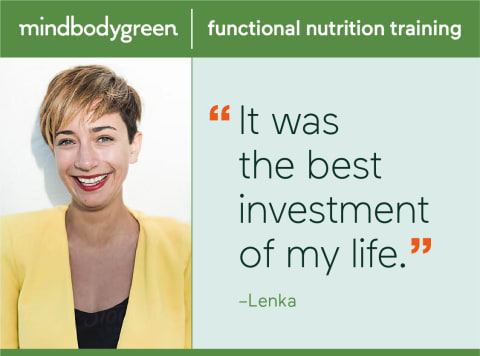Advertisement
What To Eat During Each Phase Of Your Menstrual Cycle, From An MD


If you want clues into how your hormones are functioning, look to your menstrual cycle. Since there's no such thing as a "normal" menstrual cycle, tracking yours can help identify your personal baseline, so you can then recognize if/when something feels off (which might indicate a hormonal imbalance).
In my experience as an integrative physician, I've found an imbalanced cycle can impact fertility, libido, energy levels, and more. Working with a doctor or OB/GYN to get to the root of the problem, and ultimately support your hormonal health, is always recommended.
That said, supporting your hormones shouldn't begin when things go awry: maintenance is key to sustained health. One way to practice hormonal maintenance is by eating in tune with your cycle. Below I explain the four main phases of the menstrual cycle, and the best food to support each one.
Follicular Phase
During the follicular phase, which follows menstruation and precedes ovulation, estrogen and testosterone start to rise and peak. The brain will begin producing follicle stimulating hormone (FSH), which tells the ovaries to prepare to release an egg. Eventually, one follicle (fluid-filled sacs containing eggs) becomes more dominant than the other. The more dominant follicle will produce estrogen as it grows, therefore, increasing your estrogen levels during this time, too.
Foods to eat:
- Protein, whole grains, and gut-friendly foods: As estrogen peaks over the next couple weeks, you want to make sure your elimination pathways are working well. So, eating protein and whole grains (fiber) is the key. Other nutritious gut-friendly and hydrating foods like celery, asparagus, broccoli, and cucumbers will further support your microbiome, as well as keep inflammation low.
- Seeds: Eating pumpkin seeds and flax seeds support estrogen production1 (which is rising during the follicular phase) and help estrogen and testosterone peak appropriately.
Ovulation Phase
During ovulation, the eggs are released and they travel through the fallopian tube to the ovary where it can potentially be fertilized. Though it's possible to get pregnant during any phase of menstruation, it's most likely during ovulation (this is also why you might be feeling especially horny!). Estrogen and testosterone are peaking during this time.
Foods to eat:
- Healthy fats: You want to focus on healthy fats rich in omega-3s, like avocados, chias seeds, walnuts, salmon, and eggs during this time.
- Zinc-rich foods or supplements: Additionally, you want to make sure you're getting plenty of zinc (via nuts, seeds, or a supplement) to support progesterone.
Luteal phase
The next phase of your cycle is called the luteal phase: It follows ovulation and precedes your next period. During this phase, the pituitary gland releases luteinizing hormones, starting out in low levels and continuously rising as more is released. When it's peaked, it signals the ovary to release an egg. As mentioned, the eggs are surrounded by fluid-filled sacs (aka follicles), which break down when the egg is released, building what's called the corpus luteum. The corpus luteum then breaks down and releases progesterone. This hormone helps thicken the uterine lining so it's ready for implantation.
Foods to eat:
- Anti-inflammatory, antioxidant-rich foods: After ovulation, you want estrogen to start flushing out so it does not accumulate in excess. This is why it’s important to focus on healthy eliminating foods, like broccoli seed sprouts, as well as other anti-inflammatory foods rich in antioxidants (purple cauliflower, sweet peppers, spinach, whole carrots with the skin), to fight off free radicals and continue to support your liver where estrogen is metabolized2.
- Sesame and sunflower seeds: These seeds have been shown to support women's hormones3. They also contain lignans and essential fatty acids that support the hormones present during the luteal phase.
Menstrual Phase
Day one of your cycle begins the day you start menstruating (i.e. the day your period starts). As you begin to bleed, the hormones estrogen and progesterone plummet. Blood and tissue from the uterine lining is also shedding during this phase, so your body and your hormones are undergoing drastic fluctuations—be gentle on yourself.
Foods to eat:
- Iron-rich foods: As your iron levels begin to drop, you'll want to focus on restoring those minerals. Focus on dark leafy greens, beets, sea veggies, legumes, red meat, seafood, and you may also consider taking an iron supplement. Pro tip: pair iron-rich foods with vitamin C to make it more effective. (Craving snacks? Here's what an OB/GYN recommends reaching for during your period.)
- Zinc-rich foods: Zinc can support estrogen production, so eating zinc-rich foods, like pumpkin seeds and flax seeds, supports the hormone as it begins to rise again in the next phase.
